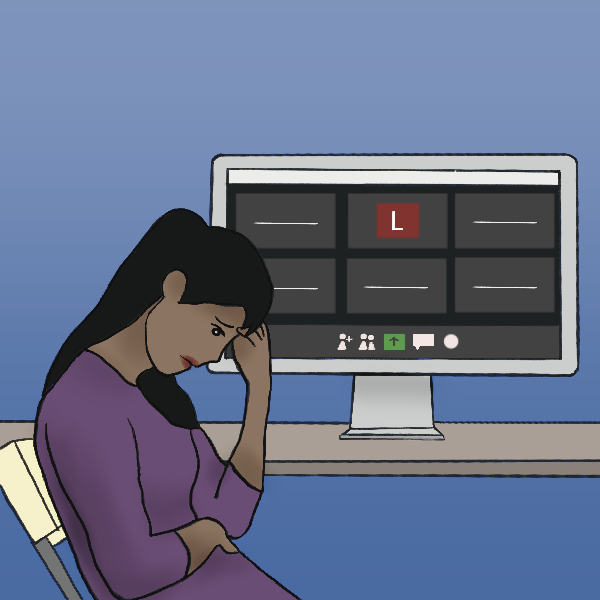Students and staff weigh feelings of disconnection with the convenience of virtual activities, classes and appointments
By ZOEY MORTAZAVI — features@theaggie.org
By now, we have all experienced the quiet discomfort of a Zoom call from our homes: we’re usually running late, not sure what to wear and assume the person on the other end can tell we’ve just rolled out of bed. This cycle became a regular part of our lives throughout the COVID-19 pandemic, and it has stuck around by effectively following the times when we can’t host those same sessions in person.
Our world is changing, and fast; however, now that COVID protocols have lessened, should we stay the course with the rapid increase of these online interactions?
Following the pandemic, there has been a blatant integration of technology and a widely recognized increase in reliance on it. In educational institutions, work environments and other areas, almost all interactions are being conducted entirely online. Technology-based engagement has quickly become the new normal, with both job interviews and jobs themselves being done from people’s homes.
For UC Davis students and staff, there is a rising question of whether or not they feel connected to the university following this technological shift. The on-campus dynamic has completely changed, sending students and staff home to their apartments and dorm rooms hours earlier than ever before as the urgency to be on campus to attend courses or activities dwindles.
Is the convenience of being able to watch lectures online through Lecture Capture and other sources worth the loss of the in-person classroom experience?
Many professors, both at Davis and globally, have expressed feeling disconnected from their students in a way that was unknown to them in a pre-pandemic world.
“No matter what I record on Zoom, it is so inferior to what you hear in the classroom,” David Osleger, a geology professor at UC Davis, said. “The classroom just feels connected; students feel like they’re actually part of something instead of online, where they’re just being passively spoken to. The depersonalization of the university is a really disappointing trend.”
Recently at Davis, students have begun discussing that many of their activities have been moved to an online platform as well. Namely, Community Advisor (CA) applications for the upcoming year were conducted entirely online and asynchronously. In other words, students recorded themselves responding to questions without participating in an actual interview. Applicants were told they would receive word of their application status in February.
“I think there are a lot of pros and cons,” Kyra Victor, a first-year cellular biology major, said regarding the CA interviews. “It’s really convenient and allows for people to not have to travel for interviews, especially as it becomes more common for people to work from home. Still, to me, it felt way harder to make a ‘good impression’ because I feel like people tend to be less expressive when talking to a screen as opposed to a person.”
The sheer convenience of being able to conduct interviews, office hours and even advising appointments online has completely changed the dynamic of many UC Davis activities.
While many at Davis and other universities have reported feeling uncertain and at odds with the extent of the new technological normalcy, many others find that there are more pros than cons. These online opportunities have allowed people to attend important personal events because their work and school lives can often accommodate their absences.
“For many, digital interactions could only do so much as a stand-in for in-person communication,” a Pew Research Center article stated. “About two-thirds of Americans (68%) say the interactions they would have had in person, but instead had online or over the phone, have generally been useful — but not a replacement for in-person contact. Another 15% say these tools haven’t been of much use in their interactions. Still, 17% report that these digital interactions have been just as good as in-person contact.”
While some seem to appreciate the convenience of online interactions, many find that it does not seem worth the connections that we are losing with our peers, coworkers and professors. It is difficult, even impossible for some, to find a feeling of connection with people they’re working with when they’re collaborating from the privacy of their own bedroom.
“Before moving to campus, my course advising appointment was done online and I wasn’t a huge fan of it,” Ashley Rewa, a first-year sociology major, said. “I figured that once we were all on the same campus, those kinds of appointments would be in person — but so far that hasn’t changed. I feel pretty disconnected from the school sometimes. It really isn’t the same doing so many of my activities from my dorm room.”
There are many activities that have yet to be conducted in person again after switching to an online platform throughout the pandemic. At UC Davis, many students and staff are expressing the same complaint: they feel separated from the college community. Despite these feelings of isolation, we’re not too far gone yet. Even though technology is becoming the new normal, it has yet to take over university campuses completely.
Until then, students and staff are doing what they can to maintain and create new connections with one another, both in-person and online.
Written by: Zoey Mortazavi — features@theaggie.org




